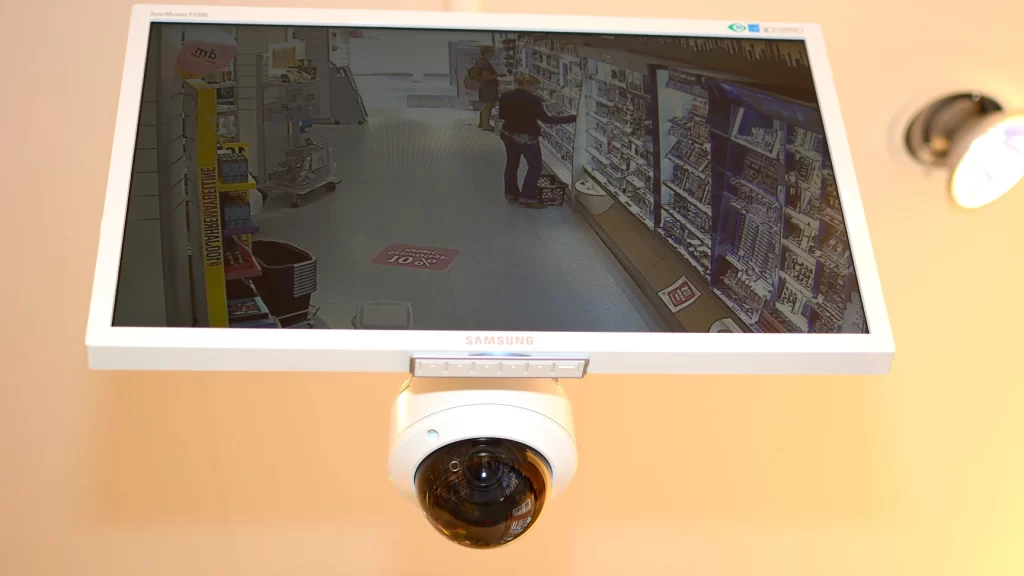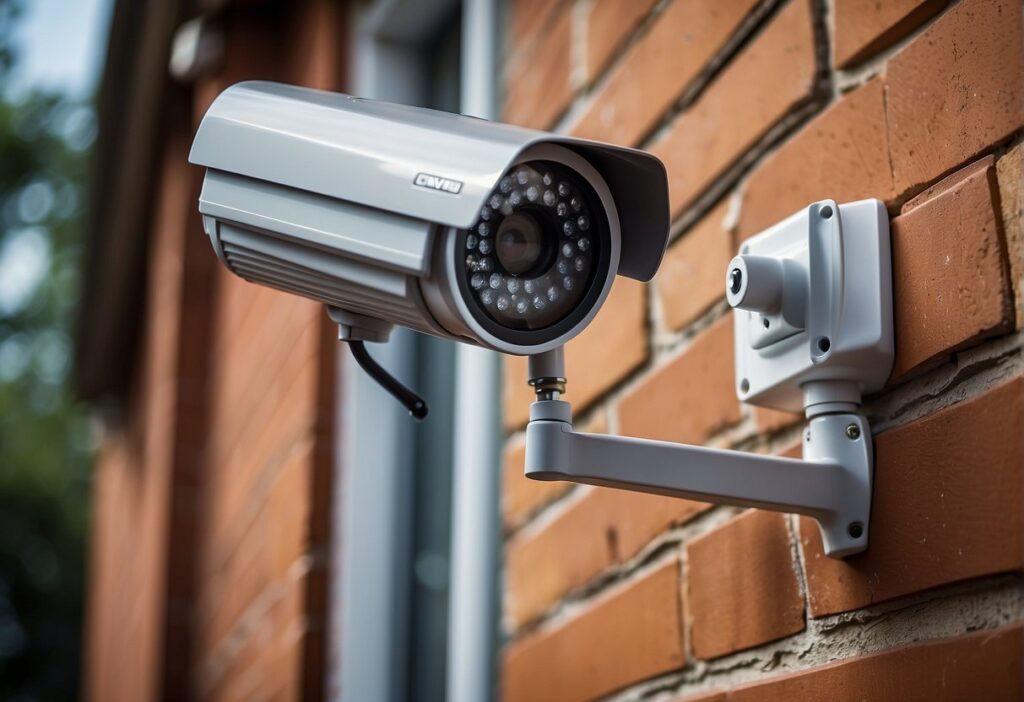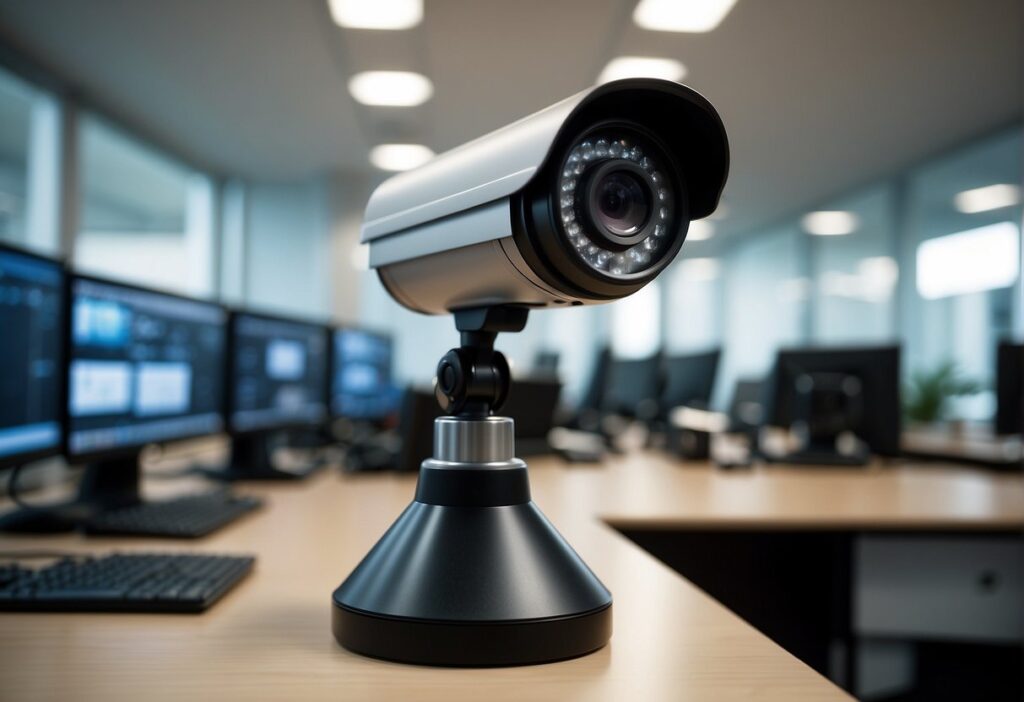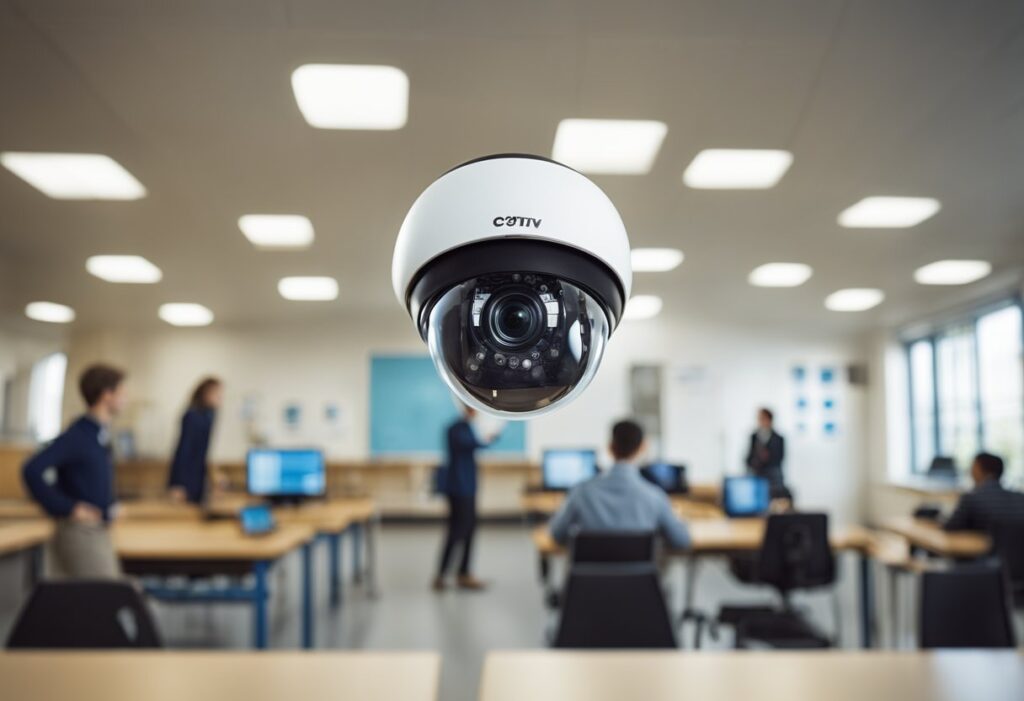10 Advantages of CCTV
Closed-circuit television, or CCTV, is a staple of security systems in both residential and commercial settings. Its presence serves as a deterrent to potential criminals and a means of collecting evidence should a crime occur.
The advantages of CCTV extend beyond security, including its role in monitoring operations and ensuring safety within premises. It is also cost-effective, as it may reduce the need for physical security guards and contributes to legal compliance by providing visual evidence when needed.
Key Takeaways
- CCTV systems enhance overall security and monitoring capabilities.
- They offer operational benefits and increased safety for businesses.
- CCTV is a cost-effective solution with legal and evidential value.
10 Advantages of CCTV: Enhancing Security and Safety
Security cameras play a crucial role in strengthening safety measures. They act as a crime deterrent and provide real-time monitoring, with advanced technologies like night vision capabilities.
Crime Deterrence
The presence of CCTV surveillance systems significantly reduces the likelihood of criminal activities. They serve as a visible reminder that an area is under watch, which discourages potential intruders and contributes to crime prevention.
Real-Time Monitoring
Surveillance cameras offer the benefit of monitoring spaces and activities as they happen. This allows for immediate action or response to any suspicious activities, enhancing the security of the monitored premises.
Night Vision Capabilities
Modern security cameras come equipped with night vision technology, allowing for clear footage even in low-light conditions. This feature ensures that surveillance is effective around the clock, bolstering security during the hours when businesses are closed or properties are less active.
Business and Operational Benefits
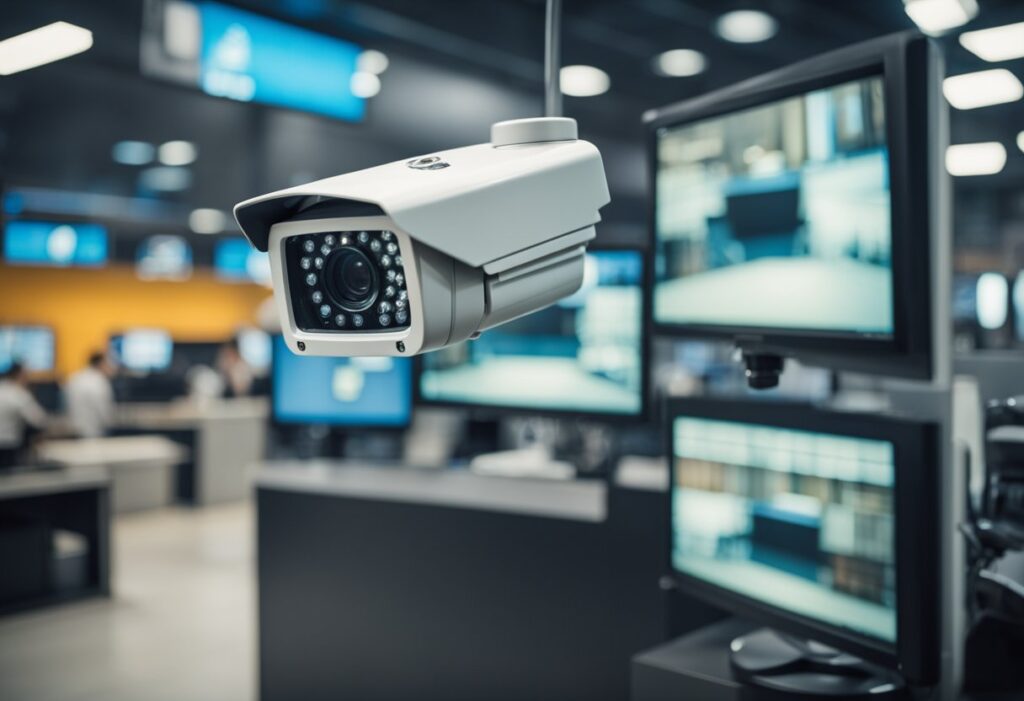
The implementation of CCTV systems offers tangible benefits that enhance business efficiency and secure assets. Central to these advantages are the improvements in employee productivity, theft protection, and resolution of disputes.
Employee Productivity Monitoring
CCTV cameras serve as an effective tool for monitoring workplace activities, ensuring that employees remain focused on their tasks. This visibility often corresponds to an uptick in overall employee productivity, as workers are aware that their performance is being assessed.
Protection Against Theft
By strategically placing CCTV systems around a business premise, they act as a formidable deterrent against theft. The risk of employee theft is also mitigated, offering businesses a robust safeguard to protect their assets from internal and external threats.
Aid in Dispute Resolution
In instances where a dispute arises, either involving staff or between staff and customers, CCTV footage provides clear evidence that can be vital in an investigation. It not only helps in quickly resolving conflicts but also in preserving the integrity of the sales process.
System Efficiency and Flexibility
CCTV systems have evolved to offer superior system efficiency and flexibility, providing advanced features for both storage and accessibility, remote viewing capabilities, and seamless wireless camera integration.
Digital Storage and Accessibility
Digital recording technology enables the CCTV system to store vast amounts of video data efficiently. These systems allow for extended recording durations on digital storage mediums, which can be easily searched and accessed for monitoring purposes.
Remote Viewing
Remote viewing technology empowers individuals to monitor their CCTV system from any location using devices such as smartphones or computers. Users can view live feeds or access recorded footage through secure internet connections, enhancing the flexibility of the video surveillance system.
Wireless Camera Integration
The integration of wireless cameras into a CCTV system facilitates easier installation and can reduce structural modifications. Wireless cameras offer the advantage of being placed in various locations without the need for extensive cabling, improving the adaptability and scalability of the video surveillance system.
Cost-Effectiveness and Investment
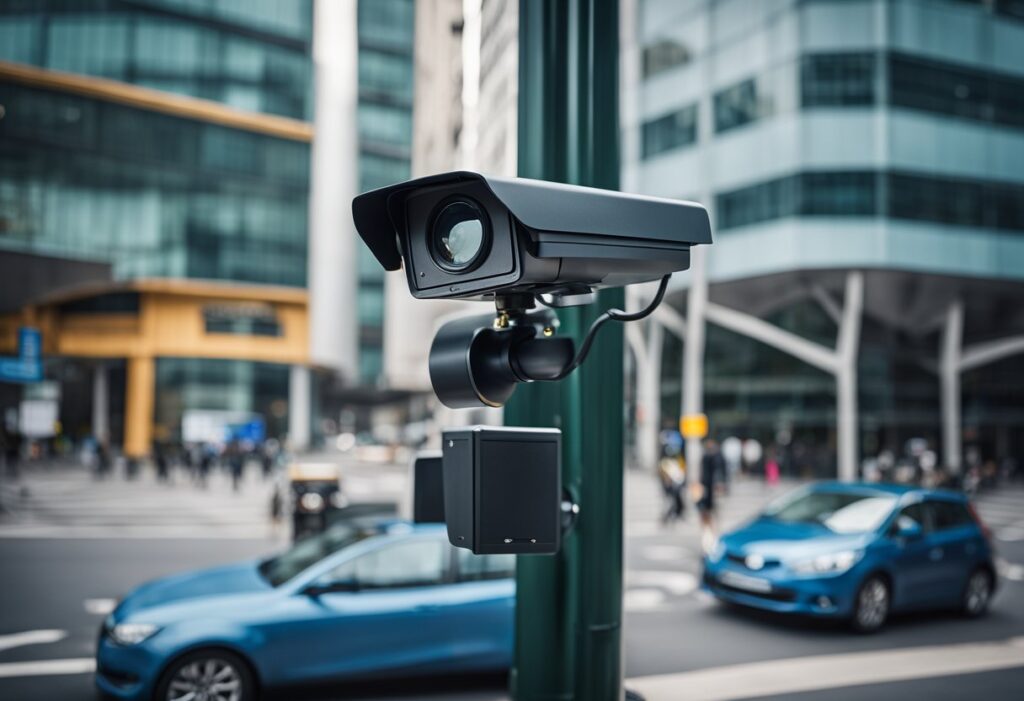
Investing in CCTV cameras can offer both immediate and long-term economic benefits. Cost-effectiveness is often a deciding factor for businesses when assessing the value of security investments.
Long-term Investment Value
CCTV cameras are a capital investment that can increase security for several years after installation. They frequently demonstrate their value over time by contributing to the prevention of costly security incidents.
Reduction in Security Expenses
By deterring crime and reducing the need for on-site security personnel, CCTV systems can significantly cut ongoing security costs. Evidence shows that the presence of CCTV cameras can reduce the incidence of criminal activity, hence lowering potential losses from theft and vandalism.
Legal Compliance and Evidence Gathering
Incorporating CCTV systems helps organizations adhere to strict security regulations and facilitates the gathering of concrete evidence. Efficiently deployed cameras can also serve as an impartial means to document incidents, ensuring transparency.
Compliance with Security Regulations
Organizations use CCTV systems to comply with legal security measures. These regulations may dictate the necessity of having surveillance in place to deter crimes such as burglary and vandalism, thereby safeguarding both public and private assets.
The presence of cameras can be a mandatory requirement in certain industries to monitor and prevent unauthorized access or actions.
Reliable Evidence Collection
Cameras serve as silent recorders, capturing continuous footage that can prove vital when one needs to gather evidence for legal proceedings. A CCTV recorder ensures that the visual evidence remains intact and tamper-proof, which is critical in substantiating claims or providing counterevidence against fraudulent accusations.
Recordings can be instrumental in not only determining the occurrence of events like theft or vandalism but also in protecting privacy rights by establishing clear boundaries of surveillance.
Conclusion
10 Advantages of CCTV
CCTV systems serve as a significant deterrent against unlawful activities, not only documenting events but also by mere presence suggesting surveillance. The technology allows for real-time monitoring of spaces, contributing to enhanced public safety and security.
The practical applications of CCTV range from crime deterrence to traffic monitoring, making them a versatile tool for various settings. They also play a pivotal role in gathering evidence, proving crucial in judicial proceedings.
Despite concerns such as privacy, the positives offered by CCTV installation are substantial.
Frequently Asked Questions
How do CCTV systems enhance safety in public areas?
CCTV systems act as a visual deterrent to potential wrongdoers in public spaces. They provide real-time monitoring, which enables swift response to any suspicious activities.
In what ways does the presence of CCTV in schools contribute to student security?
In schools, CCTV cameras help to monitor hallways and classrooms, thereby increasing the safety of students. They discourage unacceptable behavior and provide evidence for investigations when incidents occur.
What are the primary functions of CCTV cameras in crime deterrence?
CCTV cameras serve as a significant deterrent to criminals by increasing the risk of detection and prosecution. They record activities, which helps law enforcement agencies in identifying and apprehending perpetrators.
Can you explain the role of CCTV in improving workplace security?
CCTV surveillance in the workplace prevents theft and vandalism, ensuring a safe environment for employees. It also monitors employee conduct, which helps in reinforcing company policies.
What are the special features that make CCTV an important tool for surveillance?
Modern CCTV systems come equipped with high-definition video capabilities, night vision, and motion detection. These features enable detailed monitoring and allow for effective surveillance in various settings.
What financial considerations should be taken into account when installing a CCTV system?
The cost of CCTV systems can vary widely based on features and quality. Budgeting must account for installation, maintenance, and potential upgrades to meet evolving security needs.
